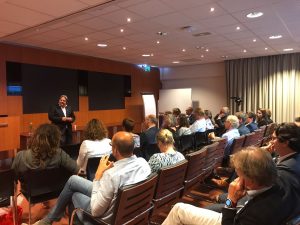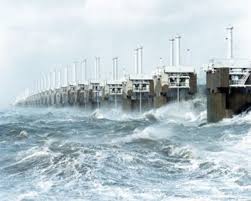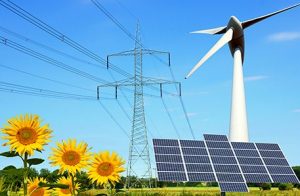 In June 2017, I had the honor to co-host an event about the energy transition at Nyenrode Business University. The event drew alumni interested in sustainability and/or market & government matters. The main speaker, Ruud Koornstra, captivated the audience with his call to action about the transition to renewable energy. Here’s what he had to say about winning Paris, Dutch ingenuity and leading change.
In June 2017, I had the honor to co-host an event about the energy transition at Nyenrode Business University. The event drew alumni interested in sustainability and/or market & government matters. The main speaker, Ruud Koornstra, captivated the audience with his call to action about the transition to renewable energy. Here’s what he had to say about winning Paris, Dutch ingenuity and leading change.
Who’s in charge: business or government?
The initial question for this event was whether business or government should lead the implementation of the Paris climate accord. Ruud Koornstra, the Netherlands’ first energy commissioner, however, made it clear that this is really the wrong question to ask. As we cannot afford to wait for either to lead. He called on all of us to act, as citizens, consumers, entrepreneurs. Yet, to kick-start action by many, we do need robust and ambitious goals. Then, we can make it all about winning Paris, instead of just reaching Paris. Why couldn’t we save the world with Dutch ingenuity?
Uniting many with ambitious goals

In January 1953, the south-western part of the Netherlands flooded, killing over 1800 people and leaving many more lives and properties devastated. Within three weeks, the Dutch government set up the so-called Delta Commission. They encouraged collaboration to fight the water and to protect the parts of the Netherlands located below sea level. Ultimately this led to the building of the Delta Works, the ambitious flood defense system. This commission has survived 16 cabinets and has had a huge impact on the country. Not only is the land protected better against the sea, but this knowledge and expertise have become one of the Netherlands’ main export products.
Why couldn’t the Netherlands reapply this same level of ambition for the transition to renewable energy? We need to fuel our society and future with what we want, creating the world we want. A transition like this one may seem to to be a really far-reaching goal, but we need to realize that much of the technology is already there. And what’s not available already, will soon be there. Gadgets from James Bond movies used to take decades to become reality, but now, most of them only take two to three years.
Transition to renewable energy
Inspired by the delta commission, the energy commission has now been established. It’s headed by Ruud Koornstra as the Netherlands’ first energy commissioner. This time, the initiative did not come from the government, yet from future-oriented entrepreneurs. The (unpaid) commissioner provides these entrepreneurs and new opportunities a voice. In just a few months, this commission has become so visible and recognized, that it even raised questions in the Dutch House of Representatives.
 The goal of the energy commission is to have the Netherlands run completely on renewable energy sources by 2030. And to leverage this energy transition to position the Netherlands as the hub of energy transition expertise, similar to the knowledge leadership the country has established on water management. As energy commissioner, Ruud Koornstra calls on everyone to contribute by joining one of the many initiatives striving to accelerate the transition. Or if you feel you have an even better idea, make a business plan and become an entrepreneur. Keeping quiet is also an option, just don’t even think about criticizing or working against those people trying to drive change.
The goal of the energy commission is to have the Netherlands run completely on renewable energy sources by 2030. And to leverage this energy transition to position the Netherlands as the hub of energy transition expertise, similar to the knowledge leadership the country has established on water management. As energy commissioner, Ruud Koornstra calls on everyone to contribute by joining one of the many initiatives striving to accelerate the transition. Or if you feel you have an even better idea, make a business plan and become an entrepreneur. Keeping quiet is also an option, just don’t even think about criticizing or working against those people trying to drive change.
Don’t be a bystander
His final plea: Don’t wait for the government or the business world to lead the energy transition. Don’t be an opinionated bystander, but help to create a better world. What will your contribution be?
Written by Marjolein Baghuis (@mbaghuis). To read about interesting people, book reviews and other posts about sustainability, change, and communications please subscribe to the Change in Context blog.

2 Comments